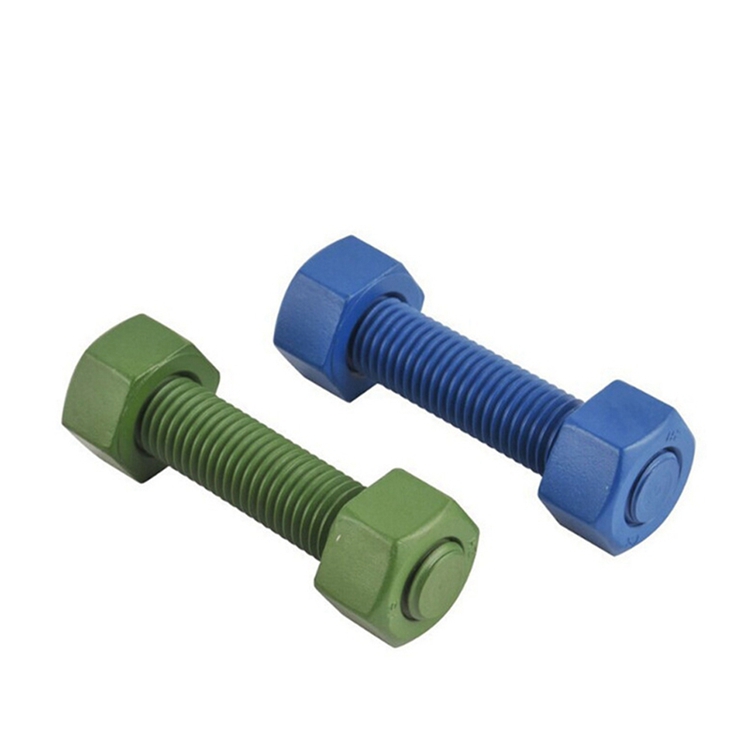Premium Quality Stud Bolts and Nuts for Reliable Industrial Applications and Enhanced Performance
Aug . 02, 2024 14:39 Back to list
Premium Quality Stud Bolts and Nuts for Reliable Industrial Applications and Enhanced Performance
High-Quality Stud Bolts and Nuts Essential Components for Structural Integrity
In the realm of engineering and construction, the importance of high-quality stud bolts and nuts cannot be overstated. These components play a vital role in ensuring the structural integrity and safety of various applications, ranging from bridges and buildings to machinery and automotive systems. As fundamental elements of fastening technology, high-quality stud bolts and nuts contribute significantly to the performance and longevity of assemblies.
Understanding Stud Bolts and Nuts
Stud bolts are essentially long, threaded rods used to connect two or more components in a secure manner. Unlike traditional bolts, which have a head on one end, stud bolts are threaded on both ends and are typically used in conjunction with nuts to form a tight, reliable connection. Nuts are hexagonal or square components that are threaded on the inside and serve to secure the stud bolt in place when tightened. This combination provides robust fastening capabilities and is widely utilized across various industries.
The Importance of Quality
The quality of stud bolts and nuts is critical for several reasons. First and foremost, high-quality materials ensure superior strength and durability. Stud bolts must withstand significant tensile and shear forces; therefore, they are often manufactured from high-grade steel, alloy, or even specialized materials such as stainless steel for corrosion resistance. High-quality nuts also contribute to the overall performance, providing a reliable grip and preventing loosening under dynamic loads.
Another critical aspect of quality is precision manufacturing. Stud bolts and nuts must adhere to stringent tolerances to ensure compatibility and proper fit. Poorly manufactured components can lead to mechanical failures, jeopardizing safety and leading to costly repairs or replacements. Therefore, selecting suppliers who adhere to international standards, such as ASTM or ISO certifications, is essential for obtaining reliable products.
high quality stud bolt and nuts

Performance in Varied Conditions
High-quality stud bolts and nuts are designed to perform under various environmental conditions. In industries such as oil and gas, where equipment may be subjected to extreme temperatures and corrosive environments, using corrosion-resistant materials is crucial. For instance, stud bolts made from duplex stainless steel offer excellent resistance to pitting and stress corrosion cracking, making them ideal for harsh applications.
Moreover, in construction, where components may experience fluctuating loads and vibrations, high-quality fasteners ensure that connections remain stable over time. This is particularly important in seismic zones or high-traffic areas where structural integrity is paramount.
The Role of Standards and Testing
To guarantee high quality, manufacturers often follow established standards and conduct rigorous testing on their products. This includes tensile testing, fatigue testing, and corrosion resistance tests, which help determine the mechanical properties and reliability of the bolts and nuts. Additionally, third-party inspections and certifications provide an added layer of assurance for engineers and construction managers tasked with maintaining safety and quality.
Conclusion
In conclusion, high-quality stud bolts and nuts are indispensable components that ensure the stability and safety of numerous engineering structures and applications. Investing in reliable, well-manufactured fasteners not only enhances performance but also prolongs the lifespan of assembled systems. Whether for construction, manufacturing, or maintenance, selecting the right products from reputable suppliers is essential for achieving optimal results. As industries continue to evolve, the demand for high-quality fastening solutions will remain a cornerstone of engineering excellence.
Latest news
-
Top Wire Bolts Suppliers - Quality & Durable Fasteners
NewsAug.15,2025
-
Trusted Wire Bolts Company | Quality Fasteners Supplier
NewsAug.14,2025
-
Reliable Wire Bolts Suppliers & Manufacturers for Global Needs
NewsAug.13,2025
-
High-Quality Bolts for Lawn Mower Handle Supplier
NewsAug.12,2025
-
Leading Phosphated Drywall Screws Supplier | Bulk & Custom Orders
NewsAug.11,2025
-
Top Wire Bolts Company: Manufacturers, Exporters & Suppliers
NewsAug.10,2025
